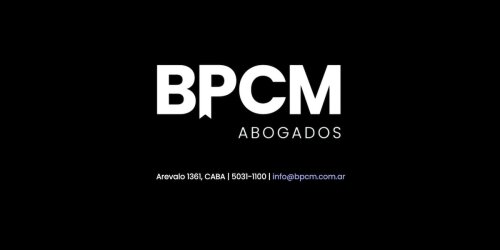Best E-commerce & Internet Law Lawyers in Buenos Aires
Share your needs with us, get contacted by law firms.
Free. Takes 2 min.
List of the best lawyers in Buenos Aires, Argentina
About E-commerce & Internet Law in Buenos Aires, Argentina
E-commerce & Internet Law in Buenos Aires, Argentina, is an evolving field that addresses the legal issues surrounding online transactions, internet use, and digital commerce. This area of law encompasses various elements, including consumer protection, privacy, intellectual property, data security, electronic contracts, and regulatory compliance. As Buenos Aires is a major hub for technology and commerce in Latin America, understanding the local legal environment is crucial for businesses and consumers engaged in e-commerce activities.
Why You May Need a Lawyer
There are several scenarios where individuals or businesses may require legal assistance in the field of E-commerce & Internet Law:
- Starting an E-commerce Business: Navigating the legal requirements for setting up an online store, including business registration, licenses, and compliance with local regulations.
- Consumer Protection Issues: Handling disputes with online sellers or platforms regarding product returns, warranties, or misleading advertisements.
- Data Privacy and Security: Ensuring compliance with data protection laws, including the handling of personal information and implementing security measures.
- Intellectual Property: Protecting digital assets such as trademarks, copyrights, and patents from infringement.
- Contractual Disputes: Resolving issues related to electronic contracts and terms of service disagreements.
- Advertising and Marketing Regulations: Understanding the legalities of online advertising and promotional practices.
Local Laws Overview
The legal framework for E-commerce in Buenos Aires is governed by both national and local legislation, with key aspects including:
- Consumer Protection Law (Ley de Defensa del Consumidor): Establishes rights for consumers and obligations for sellers, ensuring fair trade in both physical and online environments.
- Data Protection Law (Ley de Protección de Datos Personales): Regulates the collection, processing, and storage of personal data to protect individuals' privacy.
- Electronic Signature Law: Defines the legal status of digital signatures, facilitating secure electronic transactions.
- Domain Name Regulation: Oversees the registration and management of '.ar' domain names.
Frequently Asked Questions
1. What legal requirements must I meet to start an e-commerce business in Buenos Aires?
You'll need to register your business, comply with consumer protection laws, and ensure your website meets data privacy requirements.
2. How are online contracts treated under Argentinean law?
Online contracts are legally binding if they meet certain criteria, including clear terms and mutual consent, under Argentinean law.
3. What consumer protection rights do I have when shopping online?
Consumers have the right to clear information about products, return defective goods, and expect privacy of their personal data.
4. How can I protect my intellectual property online?
Register trademarks, copyrights, and patents, and monitor the internet for potential infringements while taking legal action if necessary.
5. Are there specific regulations for digital advertising in Buenos Aires?
Yes. Businesses must adhere to truth-in-advertising standards and avoid misleading or false advertisements.
6. What should I do if my personal data is breached by an e-commerce site?
Contact the company immediately, report the incident to the relevant data protection authority, and seek legal advice if necessary.
7. Can I use cryptocurrency for transactions in Buenos Aires?
While cryptocurrencies are not illegal, their legal status is uncertain, and their use is not widely regulated within traditional frameworks.
8. How is the tax applied to e-commerce activities?
E-commerce activities are subject to local and national tax regulations. It's important to understand VAT implications and potential digital services taxes.
9. What are the rules regarding content moderation on my platform?
Platforms must adhere to national laws regarding hate speech, defamation, and other illegal content, often requiring proactive moderation efforts.
10. Are there any restrictions on cross-border e-commerce?
There are customs and import regulations to consider, along with compliance with international trade agreements.
Additional Resources
For further assistance, you may consider reaching out to the following resources:
- National Directorate for Consumer Protection: Offers guidance and assistance on consumer rights.
- Argentine Data Protection Agency (Agencia de Acceso a la Información Pública): Provides resources and insights on data protection obligations.
- Chamber of Electronic Commerce (CACE): A professional association providing resources and networking for the electronic commerce sector.
Next Steps
If you believe you need legal assistance in E-commerce & Internet Law, consider the following steps:
- Evaluate the specifics of your situation and identify your immediate needs.
- Contact a qualified attorney specializing in E-commerce & Internet Law with experience in Buenos Aires.
- Prepare any documentation or information that will help your lawyer understand your case.
- Discuss your options and develop a strategy with your legal advisor.
- Stay informed on relevant laws and standards to avoid future legal issues.
Lawzana helps you find the best lawyers and law firms in Buenos Aires through a curated and pre-screened list of qualified legal professionals. Our platform offers rankings and detailed profiles of attorneys and law firms, allowing you to compare based on practice areas, including E-commerce & Internet Law, experience, and client feedback.
Each profile includes a description of the firm's areas of practice, client reviews, team members and partners, year of establishment, spoken languages, office locations, contact information, social media presence, and any published articles or resources. Most firms on our platform speak English and are experienced in both local and international legal matters.
Get a quote from top-rated law firms in Buenos Aires, Argentina — quickly, securely, and without unnecessary hassle.
Disclaimer:
The information provided on this page is for general informational purposes only and does not constitute legal advice. While we strive to ensure the accuracy and relevance of the content, legal information may change over time, and interpretations of the law can vary. You should always consult with a qualified legal professional for advice specific to your situation.
We disclaim all liability for actions taken or not taken based on the content of this page. If you believe any information is incorrect or outdated, please contact us, and we will review and update it where appropriate.









